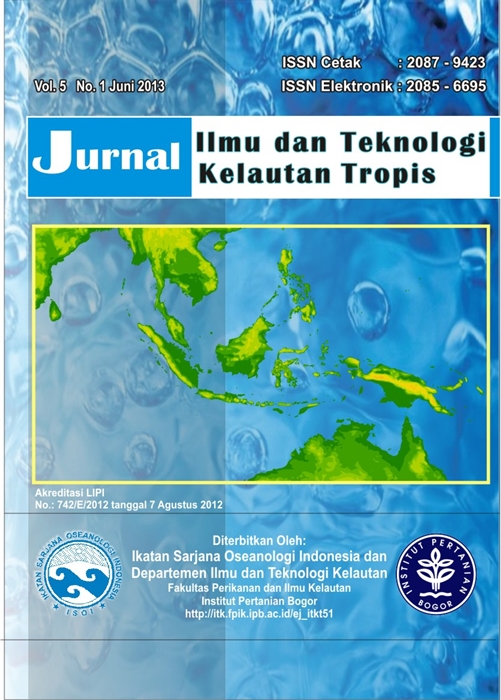EMBRYONIC DEVELOPMENT AND HATCHING EGGS RATIO OF BLACKSADDLED CORAL GROUPER (Plectropoma laevis) AT DIFFERENT TEMPERATURE MEDIA
Abstract
In seed production, the success of spawning and egg production is very important to mantain the cultivating sustainability. The quantity and quality of the blacksaddled coral grouper eggs should be properly manipulated to produce the higher values. The purpose of this study was to determine the effect of different temperatures on the results of hatch success (embryo development, incubation time, hatching rate and larvae abnormality). The eggs used were obtained from natural spawning and collected with egg collector. The fertilized eggs were incubated in four pieces of container and were treated with different temperatures of 26°C, 28°C, 30°C, and 32°C which each treatment was repeated 3 times. The incubation equipment with automatic temperature control was used in this treatment. The results showed that the eggs which were incubated at 32°C produced a faster of embryonic development and hatch within 14 hours while the temperature of 26°C took 18 hours to hatch. However, the temperature of 32°C resulted in low egg hatchability, with 60.29%, as well as the abnormalities of 8.42%. The best temperature of each treatment was obtained at the incubation temperature of 30°C, whereas the phase of the hatch was achieved within 15 hours, with egg hatchability of 92.25% and the abnormality of 6.29%. From these results, it can be concluded that the optimum incubation temperature for Blacksaddled coral grouper was 30°C.
Keywords: hatching, egg of Blacksaddled coral grouper, Plectropoma laevis, incubation temperature.
Authors
This work is licensed under a Creative Commons Attribution 4.0 International License.
Jurnal Ilmu dan Teknologi Kelautan Tropis i is an open-access journal, meaning that all content is freely available without charge to the user or their institution. Users are allowed to read, download, copy, distribute, print, search, or link to the full texts of the articles in this journal without needing to request prior permission from the publisher or the author.
All articles published by Jurnal Ilmu dan Teknologi Kelautan Tropis are licensed under the Creative Commons Attribution 4.0 International License. This allows for unrestricted use, distribution, and reproduction in any medium, provided proper credit is given to the original authors.
Authors submitting manuscripts should understand and agree that the copyright of published manuscripts is retained by the authors. Copyright encompasses the exclusive rights of authors to reproduce, distribute, and sell any part of the journal articles in all forms and media. Reproduction of any part of this journal, its storage in databases, and its transmission by any form or media is allowed without written permission from Jurnal Ilmu dan Teknologi Kelautan Tropis.


